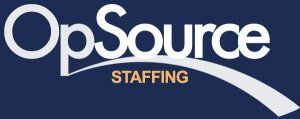Job-seekers and Employers, if you would like to discuss how OpSource Staffing Inc. can help you call us at (866) 870-8133 or Contact Us.
You’ve got a reputation for being the best coder/editor/mechanic/whatever, but it amounts to little if you don’t work well with others. Some of the most important professional skills for workers and employers alike simply can’t be taught in a classroom or measured on paper. These traits are called soft skills and they’re more crucial to your job search
and overall career
than you think.
What are soft skills?
Unlike hard skills, which can be proven and measured, soft skills are intangible and difficult to quantify. Some examples of soft skills include analytical thinking, verbal and written communication, and leadership.
Research from the Society for Human Resource
Management found that technical abilities like reading comprehension and mathematics aren’t prized as much as soft skills, meaning you have to bring more to the table than, say, great sales numbers, coding languages, or test scores.
One reason soft skills are so revered is that they help facilitate human connections. “Soft skills are key to building relationships, gaining visibility, and creating more opportunities for advancement,” says Kathy Robinson, founder of Boston career-coaching firm TurningPoint.
Basically, you can be the best at what you do, but if your soft skills aren’t cutting it, you’re limiting your chances of career
success. Read on to learn which soft skills are critical to have firmly under your belt and what steps you can take to acquire them.
Soft skills for your career
1. Communication
Why you need it:
Both written and verbal communication skills are of utmost importance in the workplace because they set the tone for how people perceive you. They also improve your chances of building relationships with co-workers. Communication skills boost your performance because they help you to extract clear expectations from your manager so that you can deliver excellent work.
Why employers look for it:
Workers are more productive when they know how to communicate with their peers, says Robinson. If you can clearly express the who, what, when, where, why, and how of a project, you’ll be a hot ticket.
How to gain it:
One way to hone your communication and presentation skills is to join Toastmasters, a national organization that offers public speaking workshops.
2. Teamwork
Why you need it:
A company’s success is rarely dependent on one person doing something all by him/herself. Success is the result of many people working toward a common goal. When employees can synthesize their varied talents, everyone wins. (Bonus: Having friends at work can also boost your job satisfaction, a Gallup poll found.)
Why employers look for it:
Employers look to team players to help build a friendly office culture, which helps retain employees and, in turn attracts top talent. Furthermore, being able to collaborate well with your co-workers strengthens the quality of your work.
How to gain it:
To generate goodwill, lend a hand when you see a co-worker in need. (“Hey, I know you have a ton on your plate. How can I help?”) Another way to build rapport is to cover for a colleague while she’s on vacation, says business etiquette and career
coach Karen Litzinger.
3. Adaptability
Why you need it:
Soft skills help you manage reality. And the reality is, things don’t always go as planned. Instead of digging in your heels, you need to be able to pivot and find alternate solutions. “Successful leaders are the ones who know how to be flexible when problems arise,” says Robinson.
Why employers look for it:
“The speed of change in any given workplace is so rapid,” says Joel Garfinkle, executive coach and author of Getting Ahead: Three Steps to Take Your Career
to the Next Level. Consequently, employers need workers who can adapt to industry shifts and keep the company current.
How to gain it:
Push yourself to be an early adopter of change. “For example, adapting to technology without mourning what used to be true yesterday is crucial for people to be seen as someone who is capable of meeting new challenges,” says Garfinkle. Inquire about training sessions and offer to teach your co-workers what you learn.
4. Problem solving
Why you need it:
When something goes wrong, you can either complain or take action. Tip: It’s the latter that will get you noticed. Knowing how to think on your feet can make you indispensable to an employer.
Why employers look for it:
Nothing is a given. Companies rely on problem solvers—a.k.a. their top performers—to navigate unexpected challenges.
How to gain it:
“Always approach your boss with a solution, not a problem,” says Robinson. So when an issue crops up, sit down and think through how you’re going to address it before bringing it to your boss’ attention.
5. Critical observation
Why you need it:
Data doesn’t mean much if you don’t know how to interpret it. Is there a pattern emerging? What else should you be looking for? Being a critical observer can help make you a better worker all around.
Why employers look for it:
Companies need critical thinkers—people who bring a fresh perspective and offer intuitive solutions and ideas to help the company get a leg up on the competition or improve internal processes.
How to gain it:
To be a critical observer, you need to be able to analyze information and put it to use. One tactic is to try to identify patterns of behavior at work. For example, does your boss actually read the weekly sales reports? What was her reaction to bad news in the staff meeting? What’s the best time of day to approach your manager with a question? By observing how people respond to the constant flow of information you can better understand the critical aspects of improving business operations.
6. Conflict resolution
Why you need it:
“Any time you put more than one person into an organization, there is going to be conflict,” says Robinson. “It’s human nature.” Therefore, being able to resolve issues with co-workers will help you maintain relationships with peers and work more effectively.
Why employers want it:
Being able to constructively work through disagreements with people is a sure indicator of maturity—as well as leadership potential. Someone like this helps to promote a healthy, collaborative workplace.
How to gain it:
The best way to resolve disagreements between co-workers is to address issues directly but delicately. So, when stepping in as a mediator, let both parties air their grievances in a judgment-free environment and then work together to find a solution.
7. Leadership
Why you need it:
Having confidence and a clear vision can help influence your co-workers and get them on board with your ideas now and in the future. Displaying such leadership skills helps you gain visibility within an organization, which can lead to more opportunities for promotions or salary bumps.
Why employers want it:
Bosses and managers are always looking for employees with leadership potential because those workers will one day be taking over the reins and building on the company’s legacy.
How to gain it:
Being a leader isn’t merely about getting people to do what you want. Leadership means inspiring and helping others reach their full potential. One way to do that is to become the internship supervisor, which gives you the opportunity to manage people, learn how to motivate a team, and take on more responsibility.
Article Provided By: Monster

Related Posts

By OpSource Staffing
•
23 Feb, 2021
Advantages: 1. Strategically balance labor needs and production levels by bringing in workers when they need them and then letting them go when they do not. 2. Convert a historically fixed labor cost to a variable one while shifting liabilities for unemployment, EEOC matters, benefits, and worker's compensation to a third party. 3. Use of contracted suppliers to manage low-skilled tasks leads to better outcomes at a lower cost. 4. Purchasing and finance departments save money on what companies pay for the hourly bill rate. Disadvantages: 1. Large disparity in pay between full-time regular employees and temps gives rise to a wide gap in the quality and dedication levels between the two types of workers. 2. Temporary workers display lower morale, higher absenteeism, greater turnover, less efficiency, and poorer work quality as compared to their full-time counterparts. 3. Decreased business efficiency as more labor hours are required to get the same amount of work done, largely due to exorbitant turnover and absenteeism, as well as constant restraining.

15 Jul, 2020
Career growth may seem like a controversial topic right now. Can you really have career growth in the middle of a global pandemic? Some people might roll their eyes at the thought or brush it off because it seems impossible. But what if it’s not? Whether you’ve been tossed into an unexpected job search or you’re secretly on the hunt for a new job, career growth should be your top priority. If you don’t make it a priority, you risk becoming stagnant, or worse, taking a step back in your career when it might not be necessary. But, even if it is a priority, you might not be taking it as seriously as you think. Here are five subtle signs you might be holding yourself back from career growth. You’re on cruise control or panic mode. This global pandemic has thrown tons of people into cruise control or panic mode. If you’re on cruise control, you’re probably telling yourself that now is not the time to make any sudden moves. Even though you’ve wanted to change jobs for a while now, you’ve likely convinced yourself that it’s best to keep your head down at work until the coast is clear. If you’re in panic mode, then you’re likely not thinking strategically about the next step in your career . You might be feeling like you have to take whatever you can get, without evaluating what you want or the various ways you can contribute to the next company. Both cruise control and panic mode are harmful to your career growth. Cruise control might feel safer, but it’s keeping you stagnant. Operating in panic mode might be stopping you from seeing all the ways you could successfully pivot your career and could have you taking detours you might not have to take. You’re not sure what career growth you want. Career growth looks different for everyone, especially right now. Career growth could mean more mentorship, more money, more leadership opportunities, more training and development, more impact, new challenges, a new industry, a better work environment, the list goes on and on. You may not want all of those things at once. You may not be able to get every single one of those things right now. But, it’s important to recognize which of those things are most important for your personal career growth so that you can at least try to aim for them. It’s like when you decide you want a specific car and all of a sudden you start seeing that car everywhere you go. But, if you never decided, you would’ve never noticed it passing you by. It’s the same way with career growth, if you don’t know what you want, you won’t have a clear focus moving forward and you’ll likely end up settling because you didn’t know what to pay attention to or ask for in your job search . You’re dwelling on the wrong things. It’s too easy to think negatively right now. But when it comes to your career growth, especially landing a new job that moves your career forward, thinking negative is 100% guaranteed to keep you stuck and stagnant regardless of how nice it would be to land a new job you’ll love. If you’re constantly asking yourself, “What if I don’t get it?” instead of, “How can I increase my chances of getting it?” then you’re spending too much energy entertaining negative possibilities when you could be welcoming positive ones. Instead of dwelling on the wrong thoughts and soaking up all the negative news, start paying attention to the things that are going right. Scroll down your LinkedIn feed and soak up the success stories of people celebrating accomplishments and starting new jobs right now, even if they are few and far between. Decide that it’s possible for you too. Attaining career growth is not just about doing the right things but thinking the right thoughts as well. You’re relying on motivation. No matter how well our intentions are, motivation is like that flaky friend who says they’re going to show up to the party but rarely ever does. When you’re worried about still meeting your deadlines, not catching coronavirus and landing a new job, you need something stronger than motivation if you want to make career growth a priority. You need a plan. When you have a clear and strategic plan on how to land a new job that will offer you the career growth you want, you can rely on discipline and consistency rather than motivation. You’re not strategic about getting support. You hear people say all the time, “network, network, network!” But, reaching out to strangers on LinkedIn expecting world-class advice and top-notch referrals without even building a genuine relationship or having a real conversation is not the way to go. Connecting with other professionals, and getting support from experts or career coaches, when done the right way, can be a catalyst for success. But if you have no clue how to do that, if you’re mass emailing people without any thoughtfulness, if you think getting support from a career coach is a luxury and not a necessity when you know you need guidance, then you’re not taking your career growth seriously and you should consider changing your approach. It is still completely possible to land a new job that moves your career forward, even right now. But it starts with you. If you know you’re guilty of one of these five things, that is good news! That means there is plenty of room for improvement and that you still have the power to move your career in a more satisfying direction. Article Provided By: Forbes

13 Jul, 2020
As of May 2020, the Bureau of Labor Statistics reported the current U.S. unemployment rate as 13.3%. While slightly down from April, unemployment is the highest it’s been since the 1930s. For many working Americans, this is the first— and hopefully last — time that we have seen anything like this. With millions of Americans now looking for work, employers need to rapidly adjust their workplace policies to remain competitive with top candidates. How Workplaces Have Changed In just a few months, the face of the American workplace has changed dramatically. March saw employees divided into groups labeled “essential” and “nonessential,” while stay-at-home orders forced teams to adapt to remote work. While some are returning to offices, job sites and other places of work, many employers are planning to permanently close some, if not all, physical locations. On May 12, Twitter made headlines as CEO Jack Dorsey announced that employees could work from home forever. This is just one of many companies reframing its view of the modern workplace. For those of us who have returned to our offices, we are met with sanitation stations, increased distance between desks, masks and other public health safety measures. Meetings are either stand-up only, with people practicing social distancing, or held virtually. What’s On The Horizon Some companies struggling with precisely how to adapt their current environment to new social distancing standards are considering adding staggered shifts to maximize space usage. In this scenario, multiple employees could share a single workspace but on alternating days, with a strict cleaning regiment in between. Along with creating a healthier environment (fewer people in close quarters), flexible schedules can allow for a reduction in office square footage. Businesses nearing the end of their lease can use this as an opportunity to downscale their office footprint and add to the bottom line. Many office space designers are considering how the change will impact future plans. For years, open office environments have been the trend. Cubicles have been replaced with standing desks, portable partitions and lots of room to roam. While closed offices and cubicles likely won’t return, it’s possible office buildings could transform from daily use facilities to places where meetings and conferences take place. National organizations may also begin opening regional hubs to provide coworking spaces for remote employees to use sporadically instead of congregating regularly in one central location. How Employers Need To Approach Hiring 1. Advertising And Follow-Through Once your team has reviewed which positions will be mission-critical for the remainder of 2020, actively advertise these jobs . A small investment combined with regular candidate follow-through will help eliminate concerns some job seekers have about the longevity of a new position. The first few emails and calls to a candidate help to set the stage for the relationship and establish your company’s culture in their mind. 2. Be Mindful Of Social Media How your organization is responding to the pandemic says a lot about your company’s culture and leadership. Candidates interested in working for your business are often actively following your posts, and their decision to join may be swayed by this content. Work with your social media manager to ensure posts come from a position of strength and positivity. 3. ‘What Have You Been Doing During This Time?’ While it may seem like an unusual question for an interview, the answer can tell volumes about the candidate’s work ethic and how serious they are about advancing their career . Many candidates are using this time to expand their knowledge and boost their skills. As you begin accepting résumés, keep an eye out for any new certifications awarded in 2020. Applicants who have invested in themselves may be a better long-term fit. 4. Establishing A Work-From-Anywhere Policy What once was a perk, the work-from-anywhere (WFA) concept may soon become the standard, and job seekers might consider it a necessity. Businesses that have put solid technology in place with clear WFA policies will likely be in a better position to attract top talent. Fairly soon, competition for candidates will become fierce. A recent Gallup survey found that 54% of office-based professionals would leave their job for one that offered flexible schedules and remote work opportunities. If you haven’t already made WFA part of your long-term business plans, you should consider doing so. 5. A Clear Public Health Plan A question bound to come up during an interview is how your company is helping to keep employees safe. While much of this article has focused on office-based professions, many of Ameri-Force’s employees work in the skilled trades, primarily in our nation’s shipyards. Most of the worksites have implemented rigorous health protocols, including daily temperature checks of all employees, frequent sanitation stations throughout the worksite, staggered shifts to increase social distancing and daily deep cleaning of surfaces. Make sure you’re relaying the steps you’re taking to candidates applying for job openings. 6. Act Quickly With millions of highly skilled Americans actively seeking work, now is the time to attract and retain the best talent. However, don’t wait too long to begin the hiring process. As states have begun to reopen, jobs are being added, and people are getting back to work. If you wait too long to hire, you may miss out on promising candidates who could have made a significant impact on your company. If you’re considering bringing on additional staff, now is the time. Article Provided By: Forbes
Celebrating 17 Years In Business 2007-2024



